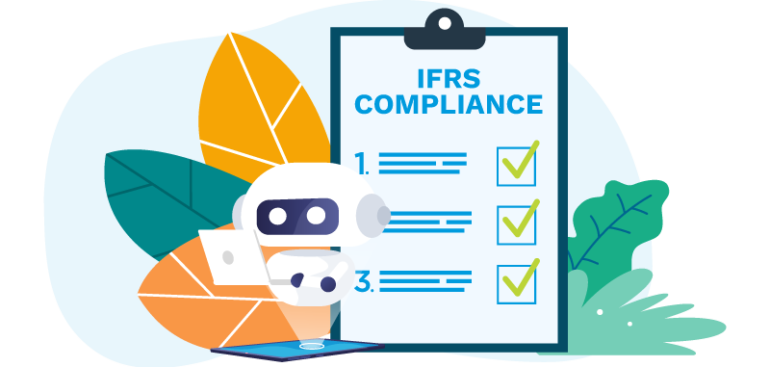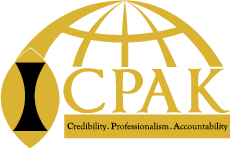The Institute of Certified Public Accountants of Kenya (ICPAK) is a statutory body of accountants established under the Accountants Act Cap 531, with the mandate to develop and regulate the Accountancy Profession in Kenya. The Institute is also a member of the Pan Africa Federation of Accountants (PAFA) and the International Federation of Accountants (IFAC), the umbrella body for the global accountancy profession.
In line with the Accountants Act, the Institute as the regulator of the Accountancy Profession is mandated to promote standards of professional competence and practice in Kenya and to guide on the adoption and implementation of Financial Reporting Standards. As a member of IFAC, the Institute ensures compliance to all the Statements of Membership Obligations and as such promoting compliance to standards within the practice of members and the country at large. The Institute participates actively in the standards setting process and provides jurisdictional perspectives that contribute to setting high quality international standards that enhance the competence of professional accountants while strengthening the worldwide accountancy profession thereby contributing to strengthened public trust.
ICPAK acknowledges the steps taken by SASRA since its formation in the year 2010 as the government’s principal agency responsible for the supervision and regulation of SACCO Societies in Kenya with the mandate to license SACCO Societies to undertake Deposit Taking Business in Kenya (FOSA) and to Supervise and regulate both Deposit Taking and Specified Non -Deposit Taking SACCO Societies. Since its establishment, SASRA has prudently steered the Sacco Sector in Kenya through prudent regulation, supervision, promotion of the sector and protection of members’ interests.
Whilst this remains the case, ICPAK notes with concern the contents of guideline No.700/721/Vol 1 (67) issued on 14th January 2025 relating to financial investments and / or deposits held by the regulated Sacco Societies in the Kenya Union of Savings & Credit Cooperative (KUSCCO) which requires further clarity. The guideline required SACCOs to immediately start recognizing impairment losses and make provisions for future write offs that would arise from the said financial investments in the financial statements.
To ensure the preparers and auditors of SACCOs are well guided in adherence to the requirements of IFRS, specifically IFRS 9 – Financial Instruments; ICPAK issues this guidance in line with its mandate as the Regulator and Standard Setter of the Accountancy Profession, bestowed with the role of issuing guidance on professional practice and adoption of financial reporting and auditing standards in Kenya.
In the recent past, KUSCCO Ltd has been reported to be facing financial challenges resulting in its likely inability to meet its obligations. This would impact the financial assets held with KUSCCO by its member SACCO Societies, including but not limited to deposits placed and equity investments. Section 33 (3b) of the Sacco Societies Act, 2008 requires Saccos to prescribe an asset review system that accurately identifies risks and assures the adequacy of provisions for losses while IFRS 9 provides comprehensive guidance on the recognition and measurement of financial investments including recognition of expected credit losses (ECL) on financial assets such as those placed in KUSCCO Ltd as well as fair value judgement on the carrying value of equity investments in KUSCCO.
ICPAK hereby provides the necessary guidance on the recognition, measurement, and disclosure of ECLs in compliance with IFRS 9 and IFRS 7 as well as IAS 10 on Events After the Reporting Period.
- Recognition and Measurement of Expected Credit Losses (ECL) and judgements related to fair value measurements for equity investments
IFRS 9 prescribes the Expected Credit Loss (ECL) model, which mandates a forward-looking approach to impairment provisioning. SACCOs must evaluate their exposure to KUSCCO related loss event and assess the associated credit risk to determine the appropriate classification under IFRS 9’s three-stage impairment model. This determination should be based on all the information and facts available on the date of the approval of the financial statements that provide evidence of the credit quality of the balances as of the reporting date.
IFRS 9 also requires the measurement of equity investments such as those that may be held in the form of share capital investments in KUSCCO.
It is possible that management of one SACCO may make a different judgement from the management of another SACCO especially given that the level of final conclusive information on the state of affairs of KUSCCO is still an evolving matter. Such judgements would depend on materiality, information available as of the date of the approval of the financial statements and other relevant factors.
ECL – Assessment of Credit Risk and Staging of Financial Assets
SACCOs must evaluate the credit risk associated with funds placed with KUSCCO, establishing whether there has been a significant increase in credit risk (SICR). In line with IFRS 9, Financial assets should be classified into one of three stages:
- Stage 1: Performing assets with no significant deterioration in credit risk, requiring recognition of 12-month ECL.
- Stage 2: Assets exhibiting a significant increase in credit risk, necessitating recognition of lifetime ECL.
- Stage 3: Credit-impaired assets, lifetime ECL with probability of default (PD) at 100%. Loss Given Default (LGD) has increased significantly, full recovery may be unlikely.
Quantification of Expected Credit Losses
SACCOs must estimate ECL based on a combination of historical data, current asset-specific and macro-economic conditions, and forward-looking information.
SACCO’s should determines the staging classification of funds placed with KUSCCO in line with the factors described above and make the requisite ECL provisions.
- Disclosure and Transparency Requirements under IFRS 7
IFRS 7 mandates detailed disclosure of credit risk exposure, the methodology used in estimating ECL, and the financial impact of credit deterioration. IFRS 7 also requires disclosure of fair value related measurements for equity investments and other Financial Assets measured at fair value.
SACCOs must ensure comprehensive disclosure in their financial reports, explicitly detailing assumptions, judgments, and the rationale behind provisioning decisions.
- Events After the Reporting Period
SACCOs must determine whether events occurring after the reporting date are adjusting or non-adjusting events in line with the provisions of IAS 10 as hereunder:
- a) Adjusting Events
- If new information arises before the financial statements are authorized for issue that provides evidence of conditions existing at the reporting date, SACCOs must adjust the recognized amounts of assets and liabilities accordingly.
- b) Non-Adjusting Events
- If the events occurred after the reporting date and do not provide evidence of conditions existing at that date, it should not lead to an adjustment in the financial statements.
- However, SACCOs must disclose the nature of the event, an estimate of its financial impact, or a statement indicating that such an estimate cannot be made.
In the case of KUSCCO, the same is likely to be considered an adjusting event for all SACCOs reporting as at 31 December 2024 with investments, savings and deposits with the entity based on the definitions above. Therefore, information received after the reporting period may be relevant in determining the staging of such financial assets as at the reporting date and therefore determining the ECL provisions and the fair value of equity investments as applicable.
Non-compliance with IFRS may result in qualified auditors’ opinions on the financial statements of SACCOs in Kenya where such non-compliance has a material impact. This would seriously undermine public trust and expose the SACCOs to regulatory, legal, financial and operational risks. Additionally, non-compliance would undermine the good standing status of ICPAK as a member of the International Federation of Accountants (IFAC) in turn affecting the global professionalism and practice including recognition of the Kenyan accountants across other jurisdictions.
The Institute will organise a joint session with SASRA to discuss the above in a bid to provide clarity and guidance to the preparers and auditors and ensure compliance in the foregoing reporting period, while assisting SASRA to further enhance the regulation of the SACCO Sector in Kenya in pursuit of public interest.
For further enquiries on financial reporting, interpretations, and adoption of standards and other related technical matters, please reach out to us at ceo@www5.icpak.com and through Standards & Technical Services Directorate and the Professional Standards Committee of ICPAK on technicalservices@www5.icpak.com .
CPA PHILIP KAKAI
CHAIRMAN, ICPAK



